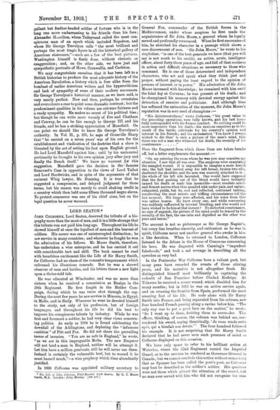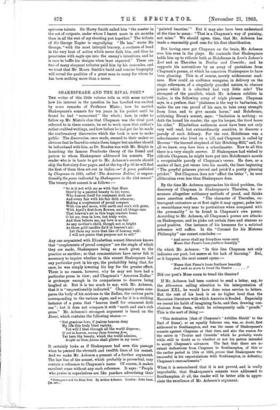LORD SEATON.* Jon i COL.BORNE, Lord Seaton, deserved the tribute
of a bio- graphy more than the most of men, and it is a little strange that this tribute was not paid him long ago. Throughout his life he showed himself at once the loyallest of men and the bravest of soldiers. His career was one of uninterrupted distinction; he saw service in many countries; and wherever he fought he won the admiration of his fellows. Mr. Moore Smith, therefore, bas undertaken a wise enterprise, and he has carried it out with considerable tact and skill. The book cannot be read with breathless excitement like the Life of Sir Harry Smith, for Colborne had no share of the romantic temperament which enlivened his illustrious comrade. But he was a shrewd observer of men and battles, and his letters throw a new light upon a thrice-told tale.
He was educated at Winchester, and was no more than sixteen when he received a commission as Ensign in the 20th Regiment. He first fought in the Helder Cam- paign, during which he was twice shot through the cap. During the next few years he saw service in Minorca, in Egypt, in Malta, and in Sicily. Wherever he went he devoted himself to the study, not only of his profession, but of foreign languages, and throughout his life he did his best to improve his conspicuous talents by industry. While he was first and foremost a soldier, he had very clear views concern- ing politics. As early as 1804 he is found celebrating the downfall of the Addingtons, and deploring the "infamous coalition" of Pitt and Fox. He did not share the prevailing terror of invasion. "You are as safe in England," he wrote, " as we are in this impregnable Malta. The new Emperor will not land a man in England, neither will he attempt it. Let him have a million gunboats, still he will never use them. Ireland is certainly the vulnerable heel, but to wound it he must hazard much,"—a wise prophecy which time abundantly justified.
In 1806 Colborne was appointed military secretary to
• The Life of John Colborne, Field-Marshal Lord Seaton. By G. C. Moore Smith, M.A. London: John Murray. [16a. net.]
General Fox, commander of the British forces in the Mediterranean, under whose auspices he first made the acquaintance of Sir John Moore, a general whom he loyally served and profoundly reverenced. When he first encountered him, he sketched his character in a passage which shows a rare discernment of men. "Sir John Moore," he wrote to his stepfather, "is one of the best generals we have (that you will say is not much to his credit), an active, acute, intelligent officer, about forty-three years of age, and full of that coolness in action and difficult situations, so necessary to those who command. He is one of those determined and independent characters, who act and speak what they think just and proper, without paying the least regard to the opinion of persons of interest or in power." His admiration of Sir John Moore increased with knowledge ; he remained with him until the fatal day at Corunna; he was present at his death ; and he champiened his memory with devoted energy against the detraction of enemies and politicians. And although time has softened the animosities of the moment, Sir John Moore's reputation was in sore need of champions :—
"His disinterestedness," wrote Colborne, "his great value in the preceding operations, were fully known, and his last hourd fully corresponded with his former conduct. So nothing could be more impressive than his death—his anxious enquiries as to the result of the battle, solicitude for his country's opinion and interest in his friends ; and his exclamation You know I always wished to die thus' is such a picture of the man's mind, that there was not a man who witnessed his death, the serenity of his countenance Here the fragment from which these lines are taken breaks off, but is letter supplements the account:— On. my entering the room where he was you may conceive my situation. I saw that all was over. The surgeons were examining the mangled wound. It is impossible to imagine a more horrid one; the ball had carried away his left breast, broken two ribs, shattered the shoulder, and the arm was scarcely attached to it— the whole of his left side lacerated. One would have supposed that the first gushing out of the blood would have instantly caused his death or made him insensible—most resolute minds and firmest nerves when thus assailed sink under pain, and nature, exhausted, yields, but he, cool and collected, continued talking, recollecting the most minute and trifling circumstances till the last moment. His lungs were affected, and his voice from this was rather hoarse. He knew every one, and while conversing was suddenly suffocated by internal bleeding, and who would not have wished to be him at that instant P No distorted countenance, no sign of anguish, the picture of the mind could be traced by the serenity of the face, the one calm and dignified as the other was pure and heroic."
The account is not so picturesque as Sir George Napier's, but every line breathes sincerity, and enthusiast as he was in
spirit, Colborne never met another general who awoke in him
a like devotion. When he returned to London, Colborne listened to the debate in the House of Commons concerning his hero. He was disgusted with Canning's "impudent falsehoods," and took a sad revenge in describing all the speeches as very bad.
In the Peninsular War Colborne bore a valiant part, but many pens have recorded the events of those stirring years, and his narrative is not altogether fresh. He distinguished himself most brilliantly in capturing the redoubt of San Francisco before Ciudad Rodrigo. At Talavera he received a severe wound, which disabled him for
many months ; but in 1813 he was on active service again, and on crossing the frontier from Spain, performed the most amazing feat of his life. He rode alone with Sir Harry Smith into France, and being separated from his column, saw four hundred French passing along a ravine below him. "The only way was to put a good face on the matter," he wrote. "So I went up to them, desiring them to surrender. The officer, thinking, of course, the column was behind me, sur- rendered his sword, saying theatrically. ‘Je voila rends cette epee, qui a bienfait son devoir.' " The four hundred followed his example. It is not surprising that Sir Harry Smith declared that he had never seen such presence of mind as Colborne displayed on this occasion.
We have only space to refer to his brilliant action at Waterloo, where the 52nd Regiment routed the Imperial
Guard, or to the services he rendered as Governor-General in Canada; but we cannot conclude this notice without remark ing that as Spenser has been called the poet's poet. so Colborne may best be described as the soldier's soldier. His qualities were not those which attract the attention of the crowd, but no man ever served with him who did not recognise his eon-
spicuous talents. Sir Harry Smith called him "the master in the art of outposts, under whom I learnt more in six months than in all the rest of my shooting put together." The tribute of Sir George Napier is ungrudging. "He has," wrote Sir George, "with the most intrepid bravery, a coolness of head in the very heat of action which never fails him, and thus he penetrates with eagle eye into the enemy's intentions, and he is sure to baffle his designs when least expected." These are two of many eloquent tributes paid him by his comrades, and we trust that Mr. Moore Smith's lucid and concise biography will reveal the qualities of a great man to many for whom he has been nothing more than a name.



























































 Previous page
Previous page